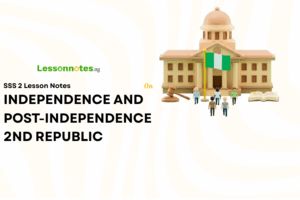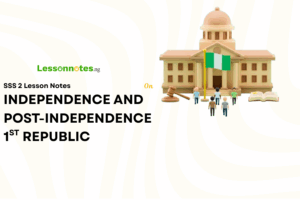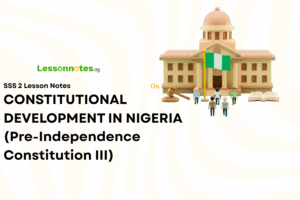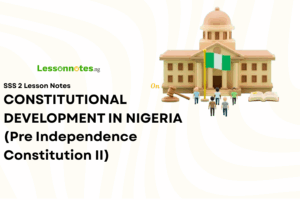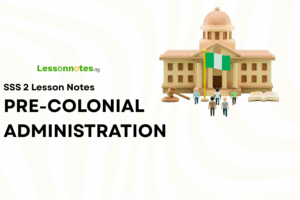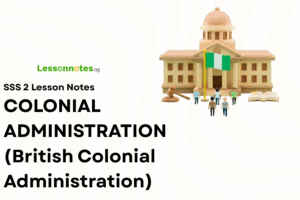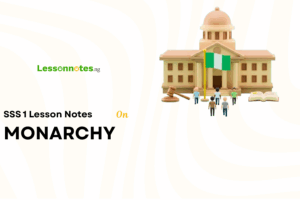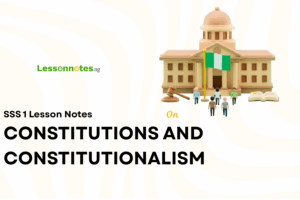Constitutional Development In Nigeria SS2 Government Lesson Note
Download Lesson NoteTopic: Constitutional Development In Nigeria

THE NIGERIA COUNCIL OF 1914
The Council was created in 1914 after the amalgamation by Lord Luggard. It consisted of 24 official and 12 unofficial members of which were Europeans and the rest were Nigerian Traditional Rulers. The Council was an advisory body without any power of legislation.
It was a medium for public opinion.
In 1922, Sir Hugs Clifford succeeded Lord Luggard as governor of Nigeria and he abolished the Nigerian council. He set up a Legislative Council for the Southern Nigeria. The North was to be governed by proclamation from the Governor.
THE NATIONAL CONGRESS OF BRITISH WEST AFRICA (NCBWA)
The National Council of British West Africa was formed in 1920 by Joseph Casely-Hayford of Gold Coast (Ghana and Dr. Akinwade Savage of Nigeria. The group had members from the four West African Colonies-Ghana, Gambia, Nigeria and Sierra Leone. The Congress demanded more African participation in administration, Judiciary and other sensitive areas of government. They equally opposed discrimination and advocated for the use of elective principles. They also demanded the development of education (university) and improved medical sectors.
Effects Of The Ncbwa
i. Africans were elected into the legislative council
ii. Introduction of elective principles in Nigeria 1922, Sierra Leone 1924, and then Gold Coast 1925.
Higher educational institutions were established in Nigeria, Gold Coast and Sierra Leone e.g. Fourah Bay College, Yuba College, and Achimota College.
iii. The NCBWA led to the development of newspapers in British West Africa e.g. Daily News of 1925 in Nigeria and The Morning Star in the Gold Coast.
The introduction of elective principle led to the springing up of political parties e.g. NNDP in Nigeria and NCSL IN Sierra Leone.
THE CLIFFORD’S CONSTITUTION OF 1922.
Features Of Clifford Constitution
- Secretary of State for Colonies: This was a Cabinet minister in Britain and the Secretary of State for Colonies. All the colonial Governors report him.
- Head of State: This was Governor Hugh Clifford. He represented the Queen of England.
- The Executive Council: It was an all-European Council. No Nigerian was a member
- The Legislative Council: Membership was 46, 27 were officials, and 19 were unofficial members. 10 out of the 19 were Nigerians. Out of the 10, 4 were elected, 3 from Lagos, 1 from Calabar. The remaining 6 were appointed by the governor to represent other parts of the country. v. The Northern Protectorate was not part of this council.
- Proclamation: The North was governed by a proclamation from the Governor.
- Elective Principle: For the first time elections were to be conducted in the Legislative Council
- Political Activities: There were political activities and the formation of political parties, especially in Lagos and Calabar e.g. The NNDP of Herbert Macaulay.
Merits Of Clifford’s Constitution
- The constitution allowed political activities and the formation of political parties in Lagos and Calabar e.g. NNDP.
- Newspapers were established to boost political activities.
- The introduction of the elective principle allowed Nigerians to elect representatives for the first time into the legislative council.
- The constitution established a new Legislative Council for the colony and Protectorate of southern Nigeria except the Northern Protectorate.
- The constitution gave inspiration to nationalist activities in the country and this prepared the ground for self-government.
- It served as the first-ever constitution in Nigeria.
Demerits Of Clifford’s Constitution
- The constitution disenfranchised the majority of Nigerians. The four unofficial members elected into the legislative council were elected by Adult Male Suffrage with a residential qualification of one year and a gross income of E100 per annum.
- Only Europeans dominated the Legislative Council.
- The executive council was also dominated by the Europeans.
- The elective principle applied only in the legislative council. The franchise was not extended to the executive council.
- The unofficial members elected into the legislative council were illiterates.
- The governor had veto power over issues in the executive and legislative councils. Clifford’s Constitution brought about sectionalism, it was a constitution for the South only, and the North was excluded.






